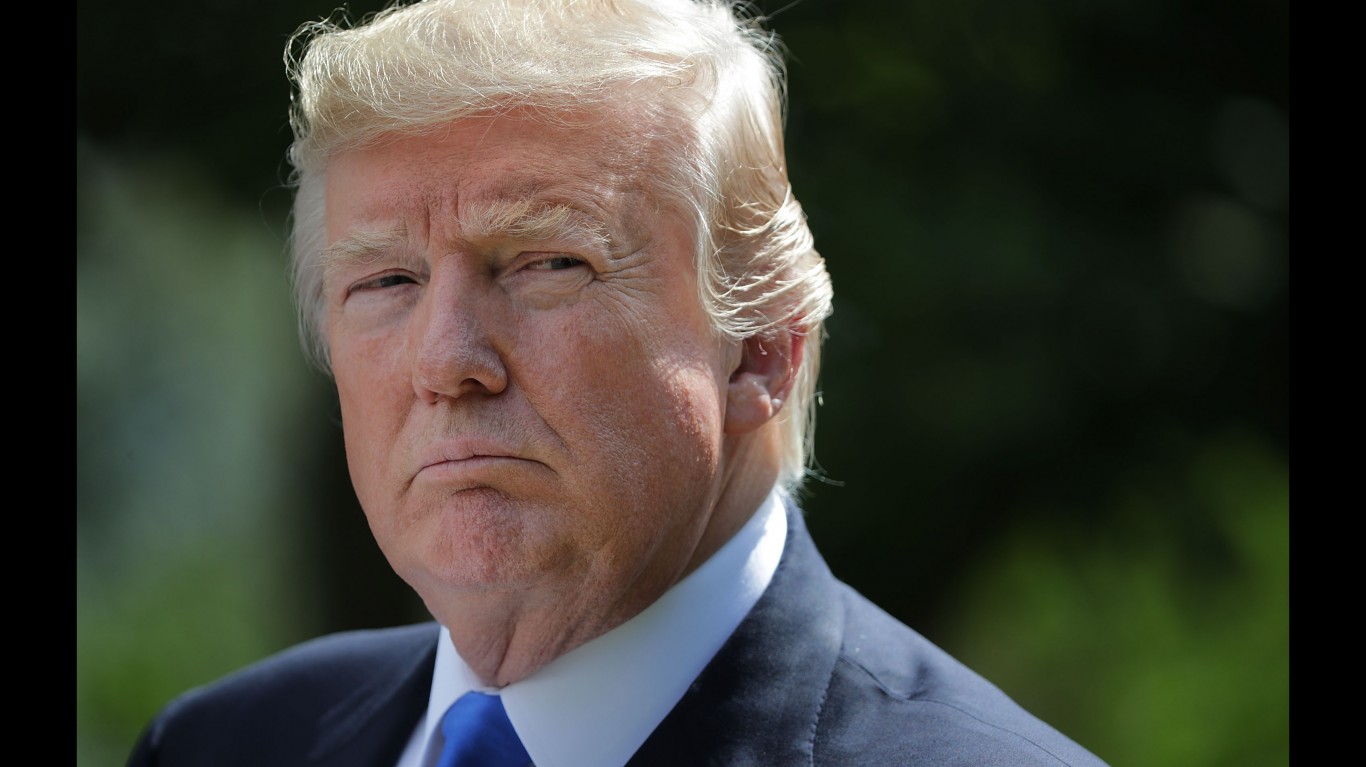
The stock market is celebrating Donald Trump’s presidential election victory. The Dow Jones Industrial Average roared higher at the open, surging 1,290 points for a 3% gain, while the S&P 500 and Nasdaq were both 2% higher to start the day.
And it’s not just U.S. markets cheering. The U.K.’s FTSE 100 jumped 1.5%, Japan’s Nikkei index rocketed 3% higher, and Hong Kong’s Hang Seng index rose more than 2%.
It seems clear investors all around the world are excited by what Trump 2.0 means for the stock market. But the euphoria will fade as we get down to the nitty gritty of policy, so let’s see what a second Trump presidency means for stocks.
24/7 Wall St. Insights:
- Donald Trump became only the second president in U.S. history to win two, non-consecutive terms in office.
- The once-and-future president made many promises on the campaign trail to lower corporate and individual taxes, enact deregulation, and streamline and make more efficient the government bureaucracy.
- Many businesses and industries ought to benefit from his proposals, though not all. The pharmaceutical industry, for example, could come under stricter scrutiny.
- The main themes of Trump’s candidacy should have an overall positive impact on equities, as higher corporate profits should lead to rising stock prices.
- If you’re looking for some stocks with huge potential, make sure to grab a free copy of our brand-new “The Next NVIDIA” report. It features a software stock we’re confident has 10X potential.
Taxes, regulation, and bureaucracy in the crosshairs
Trump made a lot of promises on the campaign trail and some may be a challenge to keep. He talked about doing away with taxes on tips and toyed with the notion of eliminating the income tax, replacing the lost revenue with tariffs on our trading partners.
While all the proposed tariffs might not come to pass, because other markets might drop their own duties on U.S. goods in response to the threat, it could mean higher costs for consumers on imported goods, including those from U.S. companies that make products overseas and bring them to the U.S. to sell.
The once-and-future president also tasked Elon Musk to rein in a bloated government bureaucracy. Musk has said that a new Department of Government Efficiency (DOGE…I see what he did there!) would seek to cut $2 trillion from the federal budget.
Musk has asked former Republican congressman Ron Paul to assist him in the effort. Paul has long been a critic of the Federal Reserve and has called for the central bank to be audited. “End the Fed” has been a rallying cry in many circles because of its causation of boom-and-bust business cycles and the cause of inflation.
Trump also promised to unleash Robert F. Kennedy Jr. on the pharmaceutical industry in a bid to “make America healthy again.” So not all businesses will fare well during Trump’s second term. Pfizer (NYSE:PFE) was down over 2% in morning trading.
Playing to America’s strengths
Equities, in particular, should benefit from Trump’s promise to cut corporate tax cuts as earnings will likely grow from the reductions. Streamlined regulation and boosting America’s natural resources, especially for the oil and gas industry, has a very real chance of having the economy roar higher. Look for oil giants like Exxon Mobil (NYSE:XOM) and Chevron (NYSE:CVX), which derive most of their revenue from international markets, to benefit.
The U.S. dollar should also be strengthened from the threatened tariffs he might impose, though there could be a backlash if it results in higher prices for consumers. Trump has said he wants to raise tariffs by 10% in certain markets, but as high as 60% on cheap Chinese goods.
Yet it could also level the playing field for U.S. companies selling goods in foreign markets, which could further boost manufacturing and jobs in those industries.
Deregulation in the banking industry and in cryptocurrency, as well as scaling back environmental, social and governance (ESG) rules could see the financial markets take off while shedding burdensome compliance regulations that could broadly increase profits.
Not a primrose path
There is the risk of inflation and for interest rates to remain elevated, but the overall path Trump seems to want to blaze is to increase real wages for workers, encourage new growth from domestic investments in the economy, and provide for greater long-term returns.
As Trump also has the benefit of Republican control of the Senate and the House of Representatives, there should be fewer roadblocks to implementing many of his policies. That’s not to say the entrenched bureaucracy won’t pushback against his attempts at streamlining government and regulations.
Right now there is reason to hope for renewed prosperity, but don’t be surprised if campaign promises don’t actually result in real-world action.
Thank you for reading! Have some feedback for us?
Contact the 24/7 Wall St. editorial team.



